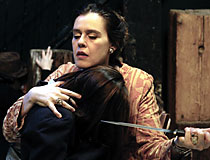Since French composer Darius Milhaud wrote
hundreds of works at lightning speed, the bulk of his output
is often considered lightweight, lacking in true artistry.
But, as the Vertical Player Repertory’s performances of his tragic
opera "Médée" shows, Milhaud was a composer
of considerable skills who was able to utilize his musical economy
of means to create great dramatic effects, whether it was in
his chamber music, symphonies or stage works.
It’s amazing that "Médée" (composed in
1939) is actually being performed live in Brooklyn at all: this
is the first time we’ve had the opportunity to hear one of Milhaud’s
operas in person. (It’s only available on CD in brief excerpts.)
Like that of many other 20th century French composers, Milhaud’s
music – in spite of its lyricism and accessibility – is rarely
heard live in performance, and it seems that this is the case
solely because no companies are programming it, assuming that
audiences always want to stay away from the unfamiliar.
That may also be the main reason why the likes of the Metropolitan
Opera and New York City Opera don’t produce any Milhaud operas
– although his grand opus, "Christopher Columbus,"
would be right at home on either stage. But several of Milhaud’s
stage works require fewer instrumental and vocal forces and are
perfect for any enterprising company to step up to the plate
and take a swing at them.
Enter Vertical Players Repertory (VPR). The company that was
founded by Judith Barnes in 1998 performs operas in a reconverted
Boerum Hill factory, and Milhaud’s "Médée"
– which has a libretto by Milhaud’s wife Madeleine (who is still
alive, as of this writing, at age 104!) and had its premiere
in Paris in 1940 – is a prime example of the type of opera it
should be introducing to audiences.
Milhaud’s opera is taken from the final sections of the Medea
tragedy from Greek mythology which includes the time Medea’s
former husband Jason is remarried to her final revenge by killing
his new wife Créuse and Jason and Medea’s only son. The
compression of the action into three tableaux, or acts, which
are quite short (approximately 70 minutes total) – coupled with
Milhaud’s economical music – makes for a propulsive operatic
tragedy of the first order.
Director Seth Baumrin, inspired by the atmosphere surrounding
the opera’s creation, has set the work in Vichy France during
the Nazi occupation. Although this doesn’t emerge clearly enough
(unless one reads Baumrin’s program notes), the fact remains
that the starkness of his staging in the group’s dilapidated
but intimate space is perfect for an opera filled with such vengeful
brutality.
Always eloquent and richly melodic, Milhaud’s music is exquisite
on the ears when performed with the refinement it calls for.
For "Médée," VPR is performing a piano
reduction of the score, which unavoidably lessens the tragic
grandeur of Milhaud’s original orchestrations. (One listen to
French soprano Natalie Dessay’s performance of one of the opera’s
arias on her 1997 recital disc from EMI Classics proves the point.)
Still, when there’s a pianist of the caliber of Audrey Saint-Gil
– who performs the score with nimble grace, strikingly underpinning
the vocal lines and often taking musical charge of the drama
– there’s certainly no reason to consider this a "lesser"
version of Milhaud’s work.
Conducting with a good feel for the opera’s musical and dramatic
arcs, Peter Szep leads an impressive roster of 17 superbly rehearsed
singers to give a tremendously affecting account of this difficult
work.
The dozen singer-actors who form the work’s Greek chorus are
splendid throughout, whether commenting on the action or participating
in it. In the silent role of Medea and Jason’s child, Lucia Pompetti
is properly docile. Mezzo Twila Ehmcke (Medea’s nurse) and baritone
Gustavo Ahuali (King Creon) invest their characters with suitable
dignity.
As Princess Créuse, soprano Sungji Kim sings beautifully,
especially in her upper register where her two arias mostly lie.
(Kim alternates the role with Heather Green, who sings the final
performance on Nov. 19.) Tenor Percy Martinez skillfully registers
the complicated emotions of Medea’s estranged husband Jason with
the necessary clarity, in keeping with Milhaud’s musical conception
of the role.
And, in the title role, Judith Barnes uses her strong soprano
voice to create a truly tragic anti-heroine. In her powerful
monologue that takes up all of the second act, Barnes cuts right
to the quick of what is the emotional center of the entire opera.
If Vertical Players Repertory had simply brought "Médée"
to the stage, that would have been good enough. But by giving
such an intensely dramatic account of this forgotten but worthy
20th century opera, it deserves our eternal thanks.
Vertical Player Repertory presents Darius
Milhaud’s opera "Médée" at 219 Court
St. between Warren and Wyckoff streets in Boerum Hill on Nov.
19 at 4 pm. Tickets are $25. For reservations and more information,
call (212) 539-2696 or visit www.vpropera.org.

























